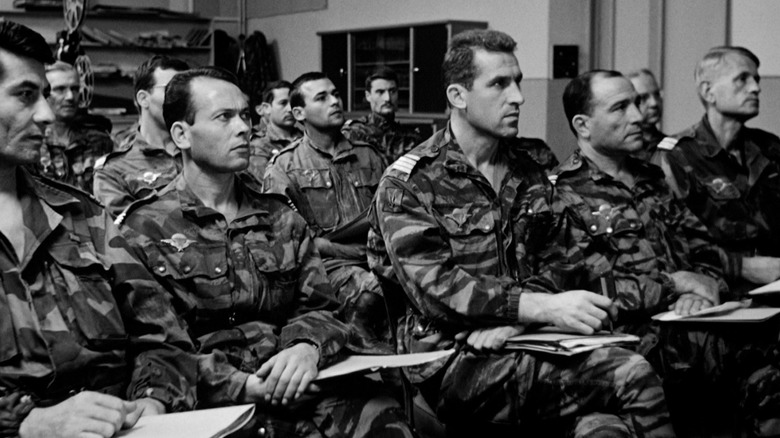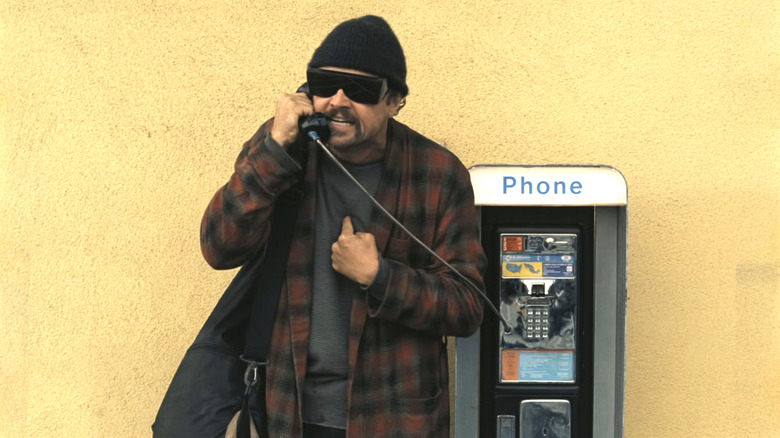Roger Ebert Loved This Classic '60s War Movie Streaming On HBO Max
One of the best movies of 1966 was "The Battle of Algiers," a war film about Algerian rebels fighting French colonial occupation. The movie, which is currently streaming on HBO Max, was notable in that it portrayed a guerilla insurgency movement in a sympathetic-ish light while not shying away from the crimes of the French military officers. It was praised by famed Chicago Tribune film critic Roger Ebert, who awarded it four stars in his 1968 review, writing:
"'The Battle of Algiers,' a great film by the young Italian director Gillo Pontecorvo, exists at this level of bitter reality. It may be a deeper film experience than many audiences can withstand: too cynical, too true, too cruel, and too heartbreaking. It is about the Algerian war, but those not interested in Algeria may substitute another war; 'The Battle of Algiers' has a universal frame of reference."
The "other war" Ebert referred to could've meant the Vietnam War, the Troubles in Northern Ireland (as depicted in the acclaimed 2024 FX series "Say Nothing"), the Israeli–Palestinian conflict, and so on. Their parallels with the Algerian War were easy to find, and critics' feelings for the movie often depended on which side they supported in those struggles. If, for instance, you were the type to dismiss the IRA as merely evil terrorists, you probably wouldn't have enjoyed "The Battle of Algiers."
And if you were French at the time, you might not have appreciated the film either. Much of the country's press was opposed to releasing the movie in French theaters. In fact, they successfully delayed the film's release in their country until 1971. But even the French eventually warmed up to the movie after enough time had passed for them to grow less defensive over their country's actions in Algeria.
The Battle of Algiers provided inspiration for later revolutionary films
Time only improved Ebert's feelings towards "The Battle of Algiers," although his interpretation of the movie's message evolved. In a 2004 piece, he wrote about how he'd come to believe the movie's perspective was not "somewhere between the FLN [National Liberation Front] and the French," but more clearly with the FLN. As he put it:
"The resistance opens with FLN members walking up to French policemen in the street and shooting them dead, often in the back. Bombs are used against police strongholds. These actions are seen in silence, but when the French respond by blowing up the home of a terrorist, the score by Ennio Morricone becomes mournful as survivors pick through the debris. His score withholds sympathy for the dead police."
The approach of "The Battle of Algiers" feels similar to Paul Thomas Anderson's "One Battle After Another," which is also a movie about a revolutionary group (known as the French 75) who use similar tactics. Although some critics feel the film condemns the violent actions of both the French 75 and the authoritarian government they're battling, others believe the movie's sympathies more closely align with the French 75. You can see that with the difference between the one death the French 75 is responsible for (a mistake that destroys their movement) and the many deaths the government causes (which are done casually with no repercussions).
It's fitting that "One Battle After Another" includes a scene where a French 75 revolutionary is seen watching "The Battle of Algiers." It seems clear that Anderson, like Ebert, is also a fan of this '60s classic. Sadly, Ebert tragically passed away in 2013, so we'll never get to know what he thought of PTA's take on such a similar dynamic.

